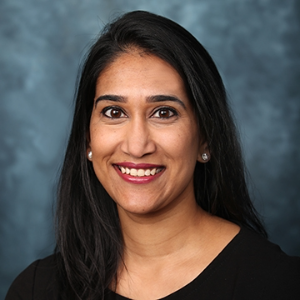
May 2025 Newsletter

May 2025 Newsletter

Faculty Profile
Leena B. Mithal, ’08 MD, ’16 MSCI, is an associate professor of Pediatrics in the Division of Infectious Diseases. As a pediatric infectious disease specialist, Mithal aims to advance understanding of perinatal microbial exposures, immune response and health outcomes.
She is a member of the Institute for Augmented Intelligence in Medicine (I.AIM), the Institute for Innovations in Developmental Sciences (DevSci), Northwestern University Clinical and Translational Sciences Institute (NUCATS) and the Center for Pathogen Genomics and Microbial Evolution.
What are your research interests?
As a pediatric infectious disease specialist, my focus is to advance understanding of perinatal microbial exposures, immune response and health outcomes. My research program encompasses both a primary microbial focus and a broader perinatal environmental exposome landscape. I study neonatal sepsis, infections during pregnancy, early life microbiome, antimicrobial resistance and the placenta.
What is the ultimate goal of your research?
I am passionate about improving prenatal and early life influences that impact an infant’s health trajectory. I aim to develop interventions that optimize factors toward a healthy pregnancy outcome and ensure that the early environment sets each child up for normal growth and development. Through our knowledge of how microbes affect infants in these critical windows, we hope to optimize diagnosis and management of perinatal infections and mediate microbial colonization to advance health.
How did you become interested in this area of research?
During my time as a neonatal hospitalist before fellowship training in pediatric infectious diseases, I was struck by the lack of evidence-based antibiotic decision-making, especially for premature infants in the neonatal intensive care unit in whom signs of clinical instability often led to prolonged broad-spectrum antibiotic treatment for possible sepsis, even without an identified pathogen. We are learning more about how prolonged early life antibiotics can be harmful, both short-term and long-term due to development of antibiotic resistance, fungal infections and altered microbiota (dysbiosis) leading to altered metabolic and immunologic programming. I wanted to develop improved methods to guide antibiotic treatment decisions and spare infants unnecessary antibiotics. We are developing novel diagnostic tools using umbilical cord blood and placental tissue toward more precise, targeted treatment of infection in this vulnerable neonatal population. My perinatal/neonatal infectious diseases niche grew from there.
What types of collaborations are you engaged in across campus (and beyond)?
I appreciated early-on the importance of collaborative research across disciplines, particularly at the maternal-infant interface. I work closely with colleagues in Neonatology (Aaron Hamvas, MD, and Tonia Branche, MD, MPH), Maternal Fetal Medicine (Stephanie Fisher, MD, MPH, and Lynn Yee, MD, MPH), Pathology (Jeffery Goldstein, MD, PhD), Infectious Diseases (Mehreen Arshad, MD, Judd Hultquist, PhD), DevSci (Lauren Wakschlag, PhD, and Elizabeth Norton, PhD) and more. My research spans the translational spectrum and thus requires collaborative work from murine models of perinatal bacterial transmission to longitudinal assessments of behavior and language development in children.
Many of our observational studies of pregnancy and early life require collaboration across institutions nationally and internationally. One example is the Environmental influences on Child Health Outcomes (ECHO) program, which we are one of 77 sites. We also work closely with colleagues studying antimicrobial-resistant bacterial colonization in lower-middle income countries.
I’m also the director the Master of Science in Clinical Investigation (MSCI) program through The Graduate School and NUCATS. The objective of our program is to produce clinical scientists who are skilled in clinical research techniques, competitive in seeking research support and knowledgeable about the complex issues associated with conducting sound clinical-translational research. As part of the program, Ravi Patel, MD, MSc, and I are excited to launch a new course: Introduction to Omics in Translational Research (MSCI 480) this summer.
Where have you recently published papers?
Our team has published papers in Scientific Reports, The Journal of Pediatrics, Clinical Infectious Diseases, American Journal of Obstetrics and Gynecology and Placenta.
Who inspires you? Or, who are your mentors?
I have had several influential mentors who have inspired me to care for children and advance pediatric research. Ram Yogev, MD, is a pioneer in pediatric infectious disease, HIV and clinical trials. Rami taught me how to think outside the box, problemsolve and forge a new path forward. I am grateful to have Patrick Seed, MD, PhD, as my primary advisor and role model who consistently pushes me forward. I am also inspired and humbled by my colleagues, physician-scientists and team members in pediatric infectious diseases whose hard work, despite challenges and hurdles, serve as fuel to do better for the children of today and the future.